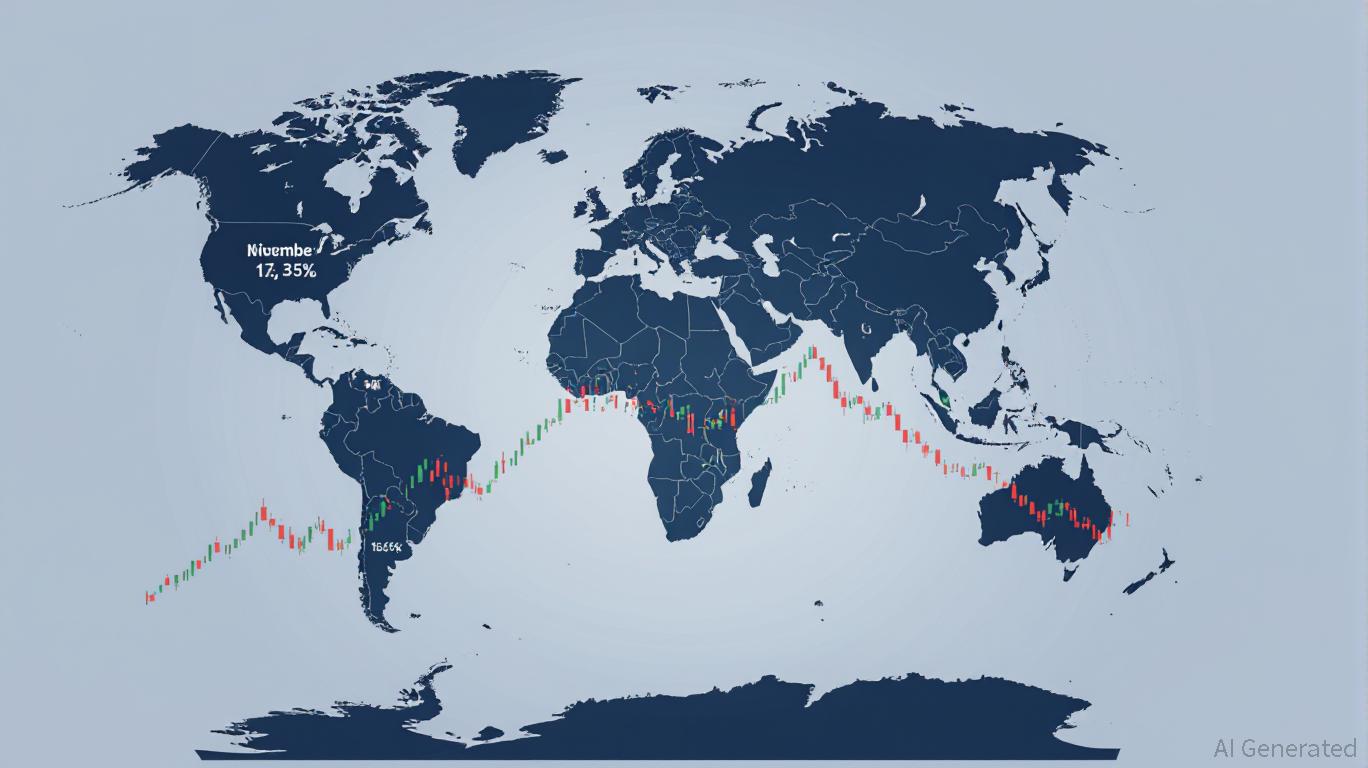Fed’s Internal Differences and Lagging Data Put Dollar at a Turning Point While Euro Strengthens
- EUR/USD climbed to 1.1590 as weak U.S. labor data and Fed policy splits fueled dollar weakness expectations. - Fed officials diverged on rate cuts: Moran favored 50-basis-point cut, Collins opposed, while Musalem noted inflation near 3%. - ECB's projected rate stability through 2027 contrasts with Fed's 125-basis-point easing by 2026, boosting euro despite global risks. - Market pricing for December Fed cuts dropped to 55% as delayed NFP data and mixed CPI components heighten uncertainty. - Technical ind
The EUR/USD climbed to 1.1590 on Monday, building on previous gains as disappointing U.S. employment figures and mixed signals from the Federal Reserve heightened expectations for a weaker dollar. This upward move came after the ADP jobs report fell short of forecasts and

The ADP data, which indicated slower private-sector hiring, has amplified worries about the strength of the U.S. economy. At the same time, Federal Reserve policymakers are divided on future actions. Dovish governor Stephen Moran
Traders are now taking a cautious approach.
Diverging monetary policies continue to benefit the euro.
The dollar's direction will likely depend on the upcoming NFP report and the Fed's subsequent actions. A disappointing jobs number could strengthen expectations for rate cuts, while a robust report might postpone easing. For now, the euro is underpinned by the ECB's firm stance and the Fed's internal disagreements, though volatility is likely as economic data and policy decisions remain unpredictable.
Disclaimer: The content of this article solely reflects the author's opinion and does not represent the platform in any capacity. This article is not intended to serve as a reference for making investment decisions.
You may also like
Nigeria's Embedded Finance Experiences Rapid Growth Amidst Reforms and International Oil Market Uncertainties
- Nigeria's embedded finance market is projected to reach $4.34 billion by 2025 with a 12.2% CAGR, driven by digital adoption in e-commerce, healthcare , and education. - Economic reforms under President Tinubu led S&P to upgrade Nigeria's credit outlook to "positive," while Moody's raised its rating to "B3" in May 2025. - Fiscal challenges persist as Nigeria raised $2.35 billion via Eurobonds to address 2025 budget deficits amid global oil price volatility and implementation hurdles. - Fintech growth acce

Bitcoin News Update: Harvard's Bitcoin ETF Decision Indicates a Change in Institutional Approach
- Harvard University increased its iShares Bitcoin Trust (IBIT) holdings to $442.8M, a 257% surge, becoming a top 20 IBIT holder. - The endowment also boosted gold ETF investments by 99% to $235M, signaling a hedging strategy against economic uncertainty. - Analysts highlight Harvard's move as symbolic validation of Bitcoin ETFs, with BlackRock's IBIT dominating 35% of U.S. inflows. - The $60.8B net inflow into U.S. spot Bitcoin ETFs since 2024 underscores institutional adoption of digital assets for diver

Polkadot News Update: Meme Tokens or Regulated Hybrids: Which Will Lead the 2025 Bull Market?
- BlockchainFX ($BFX) raises $11.2M in presale, outpacing SHIB and DOT with AOFA regulatory compliance and multi-asset trading. - BFX offers 50% bonus via LICENSE50 code, projecting 700%+ returns at $0.50/token, contrasting SHIB's speculative meme coin model. - Analysts highlight BFX's hybrid DeFi-traditional finance platform, staking rewards, and institutional roadmap as 2025 bull run advantages. - With $11.1M near soft cap, BFX's regulated framework and utility-driven model position it as a top crypto bu

The Driving Force Behind Bitcoin’s Latest Steep Drop: Macro-Economic Uncertainty Versus Investor Mood in Cryptocurrency Price Fluctuations
- Bitcoin's November 2025 plunge below $100,000 triggered $869M in U.S. ETF outflows, the second-largest single-day withdrawal. - Macroeconomic risks, including U.S. inflation and UK fiscal shifts, heightened global uncertainty, undermining Bitcoin's perceived safe-haven status. - ETF outflows and fragile retail investor confidence accelerated the selloff, with BlackRock’s IBIT and Fidelity’s FBTC losing $256M and $120M respectively. - The interplay of macro risks and market sentiment created a "perfect st
